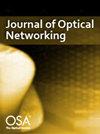Performance Evaluation of IEEE 802.11e Medium Access Control in Fiber-fed Networks
引用次数: 2
Abstract
An evaluation of the performance of the IEEE 802.11e medium access control (MAC) for quality-of-service (QoS) support in 802.11 networks has been carried out in a fiber-fed wireless local area network (WLAN) scenario. The effect of the additional optical path delay on the effectiveness of the new mechanisms of the 802.11e extension for efficiency increase, i.e., the burst transmission, and new ACK policies have been investigated. It is shown by means of analysis and simulations that although the fiber delay degrades the performance of the new mechanisms, compared with the original 802.11 MAC, significant throughput improvement can be gained when burst transmission is used with the Immediate, Block, or No ACK policies in fiber-fed networks. An experimental evaluation of the throughput improvement with the 802.11e extension is also reported. Our measurements, supported by simulations, show that higher layer operation can have a significant effect on the performance of the new MAC mechanisms, especially when transmission errors are present.光纤网络中IEEE 802.11e介质访问控制的性能评估
在光纤馈送无线局域网(WLAN)场景中,对IEEE 802.11e介质访问控制(MAC)在802.11网络中用于服务质量(QoS)支持的性能进行了评估。研究了额外光路延迟对802.11e扩展中提高效率的新机制(即突发传输)和新的ACK策略有效性的影响。通过分析和仿真表明,虽然光纤延迟降低了新机制的性能,但与原来的802.11 MAC相比,在光纤馈送网络中,当突发传输与立即、阻断或无ACK策略一起使用时,可以获得显着的吞吐量提高。本文还对802.11e扩展的吞吐量改进进行了实验评估。我们的测量得到了仿真的支持,表明更高层的操作对新的MAC机制的性能有显著的影响,特别是在存在传输错误的情况下。
本文章由计算机程序翻译,如有差异,请以英文原文为准。
求助全文
约1分钟内获得全文
求助全文

 求助内容:
求助内容: 应助结果提醒方式:
应助结果提醒方式:


